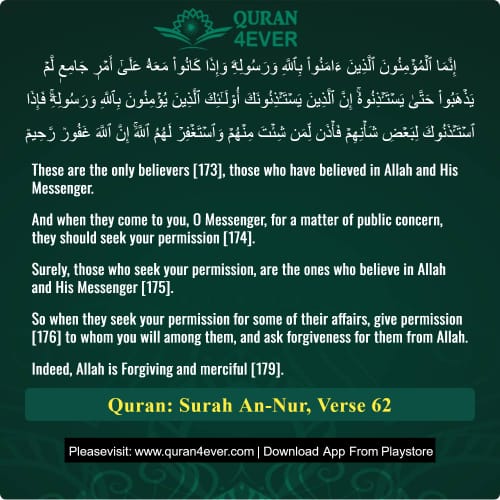
Transliteration:( Innamal mu’minoonal lazeena aamanoo billaahi wa Rasoolihee wa izaa kaanoo ma’ahoo ‘alaaa amrin jaami’il lam yazhaboo hattaa yasta’zinooh; innal lazeena yasta’zinoonaka ulaaa’ikal lazeena yu’minoona billaahi wa Rasoolih; fa izas ta’zanooka li ba’di sha’nihim fa’zal liman shi’ta minhum wastaghfir lahumul laah; innal laaha Ghafoorur Raheem )
"These are the only believers [173], those who have believed in Allah and His Messenger. And when they come to you, O Messenger, for a matter of public concern, they should seek your permission [174]. Surely, those who seek your permission, are the ones who believe in Allah and His Messenger [175]. So when they seek your permission for some of their affairs, give permission [176] to whom you will among them, and ask forgiveness for them from Allah. Indeed, Allah is Forgiving and Merciful [179]."
This verse defines true belief not only as internal conviction but also as visible respect for prophetic leadership. It begins by stating: “These are the only believers”, referring to those who show proper etiquette and seriousness in communal matters.
Faith is proven through conduct, especially in how believers relate to authority and group responsibility.
When believers are engaged in public matters, such as meetings, expeditions, or communal decisions, they are instructed to seek the Prophet’s permission before excusing themselves.
This practice reflects discipline, trust, and cohesion—qualities essential in an Islamic society, especially during the Prophet’s time.
The verse reaffirms: “Surely, those who seek your permission, are the ones who believe in Allah and His Messenger.”
This act of seeking permission is more than etiquette—it’s an expression of faith and loyalty, acknowledging the Messenger's authority as divinely appointed.
It also promotes a culture of accountability among believers.
The Prophet ﷺ is advised to grant permission to those he deems appropriate and to ask forgiveness for them—showing that even minor breaches of etiquette or misjudgments should be met with mercy and prayer, not harshness.
This demonstrates Islam’s balance between respect for rules and compassion in leadership.
The verse ends with: “Indeed, Allah is Forgiving and Merciful.” [179]
Even if believers make errors in protocol or timing, Allah's mercy remains open through the Prophet’s intercession and their own repentance.
62. The believers are only those who believe in Allah and His Messenger; and when they are with him on some common matter, they go not away until they have asked his permission. Verily, those who ask your permission, those are they who (really) believe in Allah and His Messenger. So if they ask your permission for some affairs of theirs, give permission to whom you will of them, and ask Allah for their forgiveness. Truly, Allah is Oft-Forgiving, Most Merciful.
This is another matter of etiquette to which Allah has guided His believing servants. Just as He commanded them to seek permission when entering, He also commanded them to seek permission when leaving, especially when they are doing something together with the Messenger , such as the Friday, `Id, or congregational prayers, or a meeting for the purpose of consultation and so on. Allah commanded them not to leave him in these situations until they had asked his permission. If they did this, then they were of the true believers. Then Allah commanded His Messenger to give permission when someone asked for it, if he wanted to. He said:
(give permission to whom you will of them, and ask Allah for their forgiveness.)Abu Dawud reported that Abu Hurayrah said, “The Messenger of Allah said:
(When any of you joins a gathering, let him say Salam, and when he wants to leave, let him say Salam. The former is not more important than the latter.) This was also recorded by At-Tirmidhi and An-Nasa’i; At-Tirmidhi said: “It is a Hasan Hadith.”
(24:62) The true believers[97] are only those who sincerely believe in Allah and in His Messenger and who, whenever they are with him on some common errand,[98] they do not go away until they have asked leave of him. Verily those who ask leave of you, it is they who truly believe in Allah and His Messenger. So if they ask your leave in connection with some of their affairs,[99] give leave to those whom you will,[100] and ask Allah for forgiveness on their behalf.[101] Surely Allah is Much Forgiving, Ever Merciful.
97. These are the final instructions being given to tighten the discipline of the Muslim community and make it more organized than before.
98. This commandment is also applicable in respect of the successors of the Prophet (peace be upon him) after him and other leaders of the Muslims. When the Muslims are called upon to get together for a common cause, whether relating to war or peace, it is not permissible for them to retreat or disperse without due permission of the leader.
99. This contains a warning that it is absolutely unlawful to ask permission without any genuine need.
100. That is, it depends upon the Prophet or his successor after him to grant or not to grant permission even in case of a genuine need. If he deems the collective cause to be more important than the individual need of the person, he may refuse permission, and a believer will not mind it.
101. This again contains a warning: If in asking permission there is even a tinge of excuse making, or of placing individual interests above collective interests, it would be a sin. Therefore the Prophet or his successor should also pray for the forgiveness of the one whom he gives permission.

For a faster and smoother experience,
install our mobile app now.
Related Ayat(Verses)/Topics